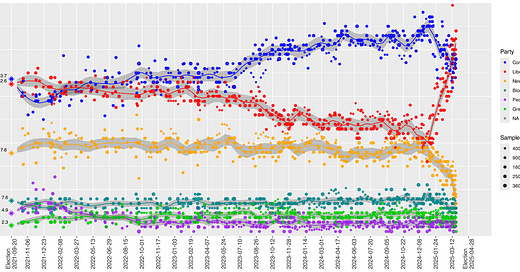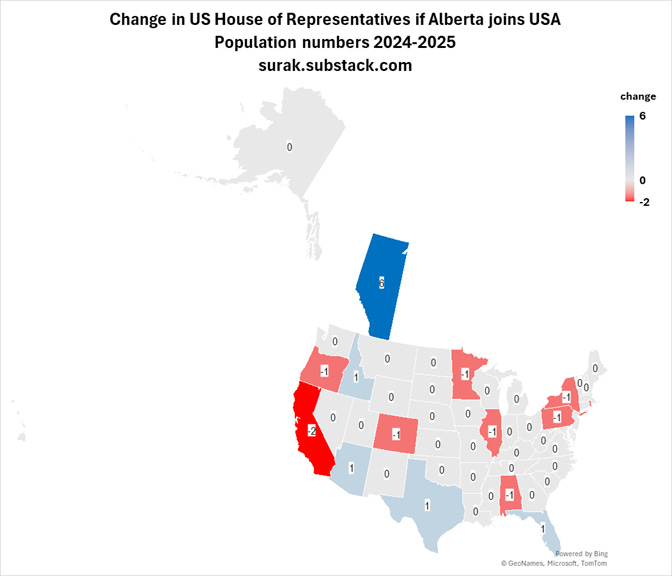I have been digesting the results of recent international elections. The results have been disappointing for conservatives, in Canada and Australia. Contrary to the spin in some of the conservative blogosphere, this was an avoidable failure, created by President Trump’s behavior. He disrespected not only Canadian leftists, but the entire country of Canada; and he placed tariffs on Australia, with which America runs a trade surplus. The backlash from abroad should not be surprising.
The graphs below depict public opinion polling leading up to the recent elections, in Canada and in Australia. In both countries, conservatives held a comfortable lead or were strengthening until Trump took office. On both graphics, the standard international color scheme is used, in which red = left, blue = right.
Nevertheless, one interesting consequence has come from the Canadian election. First let us look at the results in historical context.
Clearly, both Alberta and Saskatchewan are substantially more conservative than the rest of Canada. Apparently, Alberta wants to do something about it, by holding a referendum on independence in 2026.
From the linked article, it seems that many Albertans not only want to leave Canada, but moreover, to join America. What would be the impact on American politics?
To answer the question, I used population estimates from 2024-2025 for the 50 states, DC, and Alberta. Of course, Alberta would get 2 senators, who would almost certainly be Republicans. Assuming the House of Representatives stays at 435 seats, here are the changes. Most, if not all, of Alberta’s 6 representatives would be Republicans, and its 8 electoral votes would almost certainly be Republican.
Notice several important changes since the last US Census. The Census Bureau believes there has been substantial migration between states since early 2020. Arizona, Florida, Idaho, and Texas each would be entitled to one new representative. California would lose two, and the following would lose one: Alabama, Colorado, Illinois, Minnesota, New York, Oregon, Pennsylvania, Rhode Island.
All of the above would present a massive rightward shift in electoral politics. This does not take into account the effect of the expulsion of millions of illegal aliens, especially on California, which stands to lose much more than 2 representatives if we only count citizens. Obviously, we can expect Democrats to oppose any Congressional legislation accepting Alberta’s accession to the Union.
Democrats will also oppose repatriation of illegal aliens, as well as legislation to count only citizens in the Census. I have asked repeatedly whether the American Founders intended for invading armies to be counted in the Census. For example, if the British had invaded in 1810 rather than 1812, would their soldiers have been counted in the Census?
Saskatchewan has a much smaller population, and would be entitled to only 1 or 2 representatives, if admitted. Still, both provinces should be welcomed eagerly.









As always your analysis is flawless yet, I am still concerned at the potential upheaval should we attempt to add one or two states with a strong bias in political aspect. Should we consider the lessons that history teaches us from the years directly prior to the start of the Civil War (Or the war of Northern Domination if you are a crazy red neck). There are some excellent books that discuss the politics of the national expansion and states rights. The Road to Disunion by Freehling is excellent and extremely detailed.